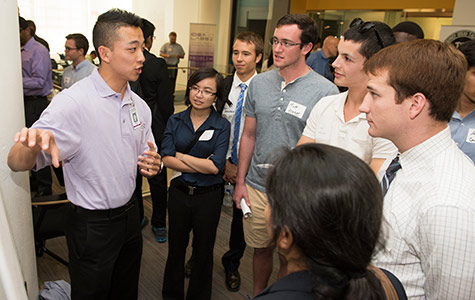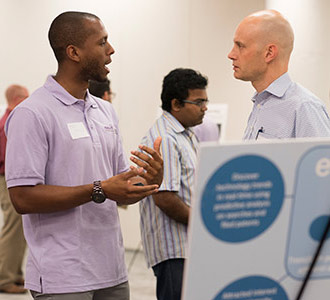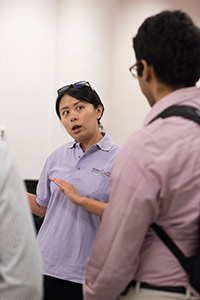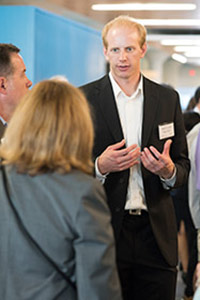
About 200 Washington University students in medicine, engineering and business recently gathered in the Cortex Innovation District to channel their inner entrepreneurs.
The networking event, known as “Problem Day,” kicked off a seven-month-long student effort to develop innovative solutions to clinical problems that plague doctors and their patients. The mixer encouraged students to build teams around specific clinical problems, merging their academic strengths to brainstorm, research and design novel devices that improve patient care.
But first, the students were schooled on one surprising key to success: failure.
Fail big. Fail small.
Fail once, twice, even more.
But no matter what, embrace the failure.
“Success requires failure,” said keynote speaker Mark J. Levin, co-founder and partner of Boston-based Third Rock Ventures, a biomedical investing firm. Since earning bachelor’s and master’s degrees in chemical engineering at Washington University in the 1970s, Levin has launched about 50 companies. Most succeeded; others failed, including a doughnut shop that emptied his bank account. “That doughnut store taught me important lessons that I carry with me today,” he said.
This was the fourth “Problem Day,” hosted by IDEA (Innovation, Design and Engineering in Action) Labs, a nonprofit bioengineering incubator founded in 2013 by Washington University students in collaboration with the schools of Medicine and of Engineering & Applied Science and the Skandalaris Center for Interdisciplinary Innovation and Entrepreneurship.

IDEA Labs involves hundreds of entrepreneurial students, faculty and community mentors, alumni, investors and corporate sponsors determined to discover marketable solutions to medical problems that run the gamut, from how to clean blood splatter on laparoscopic cameras to preventing falls in patients suffering neurodegenerative diseases and stopping patients from moving during MRI scans.
Stakes run high, with IDEA Labs commanding national attention for “its incredible reputation,” Levin said. For the 2014-15 school year, the incubator has spent nearly $80,000 to support 22 teams, 19 prototypes, 12 provisional patents vetted by law firm Husch Blackwell, and 11 startups that have raised $1.5 million in outside investments.
At this year’s Problem Day — at CIC St. Louis’ industrial-chic offices — 23 student project leaders in purple polo shirts pitched problems to students dressed Silicon Valley-casual. Problems plastered on graphic posters outlined shortcomings in health-care tools, tests or procedures that were identified beforehand by School of Medicine physicians.
Problem Day also drew student entrepreneurs from nearby colleges such as Saint Louis University and University of Missouri, St. Louis, as well as prominent industry boosters, including Holden Thorp, provost and executive vice chancellor for academic affairs at Washington University, and Phil Needleman, former chairman of research and development for Pharmacia Corp. and an emeritus member of the university’s Board of Trustees.
Like many ventures, IDEA Labs’ leaders credit the incubator’s success to its agility in overcoming obstacles. For example, IDEA Labs applied for a key grant twice before winning it on the third attempt. “The point is to fail quickly and be able to get yourself going again,” said Stephen W. Linderman, IDEA Labs president and an MD/PhD student at Washington University with an emphasis on biomedical engineering and orthopedic surgery. “Pivot if applicable, and apply what you’ve learned as you move forward.”

(Credit: Tim Parker)
During the three-hour Problem Day event, questions and answers flew back and forth, resembling a live job interview. Innovators occasionally stammered, sometimes sweated, but mostly smiled as they tried to select a team dedicated to solving a specific problem. The teams will have seven months to mold promising concepts into innovative solutions that will be presented during “Demo Day” on April 25, 2016, with hopes of attracting angel or early seed capital, mentors and early hires.
“I’m nervous,” said John Sosanya, a second-year doctoral candidate in physical therapy at Washington University who has applied to be on a team. “I’m not accustomed to being in high-risk situations of failure. But then again, I guess I wouldn’t be here now if I hadn’t failed to make my high school varsity basketball team. It was a huge blow.”
With diminished basketball dreams, Sosanya focused on football. He played it successfully until he suffered a knee injury. “It was my first interaction with a physical therapist, and it inspired me to go into physical therapy,” he said. “Now I’m here, at Problem Day, looking to use my creativity and expand my career outside of the normal confines. I’m more excited than anything.”
In addition to teaming up to solve problems, the event featured commercially viable projects from last year that need further development. One of those was Store-Easy, a manual wheelchair storage device for people with standard vehicles. Modifying a car to accommodate a wheelchair can cost thousands of dollars, while storing one in an unmodified car is cumbersome and complicated. Lifting a 35-pound wheelchair into a car also increases injury risks.
“We want to make everyday life easier for people in wheelchairs,” said Charlotte Guertler, a PhD candidate in mechanical engineering who was on the original team that developed the device.
Previous Problem Day participants included primarily the university’s engineering and medical students. However, this year the incubator received — and encouraged— increased interest from students at the university’s Olin Business School.

“Business acumen is essential throughout the process to assess the market need for a particular clinical solution,” said Jeanette Gehrig, a third-year PhD student in molecular genetics and genomics and an IDEA Labs project leader who recruited student innovations for an at-home urinalysis test and a self-cleaning camera for laparoscopy. “We can all learn from each other’s areas of expertise to design the best product possible and get it into the clinic.”
Many IDEA Labs project leaders believe passion often counts more than experience. One of the most popular presentations centered on Robert Chen’s desire to help people with neurodegenerative disorders.
“We’re looking at the fastest growing unmet medical need of our time,” Chen, an MD/PhD student, told a wide-eyed crowd. “I am looking for passionate people on my team to help prevent falls in Parkinson’s patients and to develop early detection of Alzheimer’s.”
Responded Olin graduate student Samantha Feng: “I have the passion to help find solutions.”
Feng and Chen then engaged in an enthusiastic conversation about building a business plan, creating compelling marketing materials through storytelling and digging into data analysis.
“We have a lot of students at this school who are used to success and don’t like failing,” Chen said. “I’d rather have someone on my team who shows passion and creativity, because those are the people unafraid to fail. This is key to successfully solving these problems.”
Click here to read Outlook magazine’s recent feature on IDEA Labs.
Comments and respectful dialogue are encouraged, but content will be moderated. Please, no personal attacks, obscenity or profanity, selling of commercial products, or endorsements of political candidates or positions. We reserve the right to remove any inappropriate comments. We also cannot address individual medical concerns or provide medical advice in this forum.